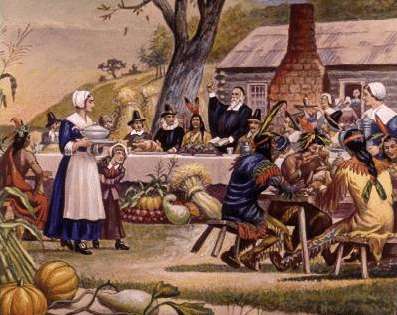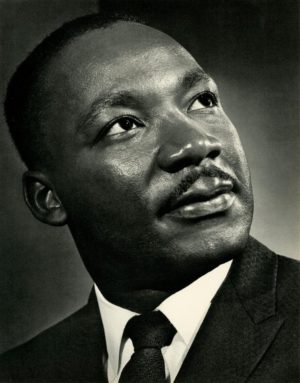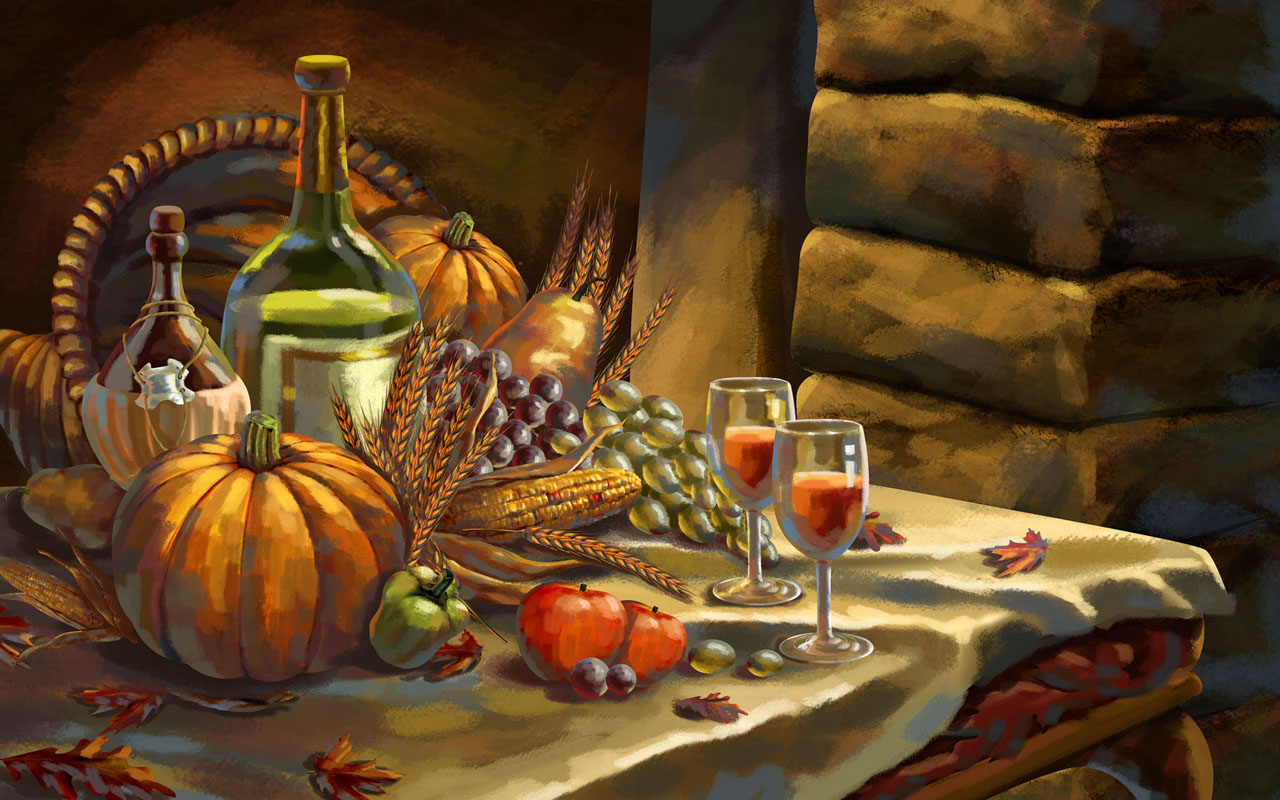True Pilgrims, True Thanksgiving

Once again, the Thanksgiving holiday is upon us and our minds are filled with images of pilgrims and pumpkin pie. All across our nation it is a time of family gatherings, feasting, and football. Such celebration can be good and godly, but it can best be these things if we remember the holiday’s origins and truly enter into the spirit of giving thanks. The pilgrims have much to teach us about thanksgiving.
Who were these people we know as the pilgrims? They were Puritans who felt conscience-bound to separate from the Church of England when that church in 1604 demanded strict conformity to the Book of Common Prayer in worship. These Puritans longed for a more thoroughgoing Reformation in order to worship only in ways clearly mandated in Scripture. At first, they worshiped secretly in homes in England, but persecution was on the rise. One such group in the town of Scrooby soon realized that they would have to leave the country in order to worship freely. They went first to Holland, but troubles there signaled time for another move. When the Mayflower set sail for America in 1620, 37 of its 102 passengers were Puritan Separatists from Scrooby that had settled in Holland. Many in the community stayed behind in Holland with their pastor, John Robinson, intending to join their friends and loved ones in America later on.
The two-month trans-Atlantic voyage was often rough and miserable, and things only got worse when they reached the New World in November. They began building their settlement in the midst of a deadly winter, through which only 55 of the 102 passengers survived. Eight children who had come with at least one parent now had none. Of 18 adult women, only four survived. Many reunions planned with those left behind in Holland would now take place only in heaven. It was a bitter beginning.
Spring and summer brought a peace treaty with the Indians, who helped teach the settlers how to farm in the New World. Crops were limited but sufficient for survival when combined with the fruits of foraging and hunting. When the harvest came in, there was a three-day celebration by about 50 settlers and 90 native Americans. It was a time of feasting, recreation, and giving thanks to God for the blessings of the harvest. This celebration is commemorated by our Thanksgiving holiday.
How was it that these settlers could be so thankful after all the tragic losses of the previous year? I suggest it was because they were true pilgrims. They didn’t generally refer to themselves in this way. The closest they came to doing so is a statement by William Bradford in his book, Of Plymouth Plantation:
So they left that goodly and pleasant city [Leyden in Holland] which had been their resting place near twelve years; but they knew they were pilgrims, and looked not much on those things, but lift up their eyes to heaven, their dearest country, and quieted their spirits.
This language echoes that of Hebrews 11.13-14, which speaks of believers as “strangers and pilgrims on the earth” who “seek a [heavenly] homeland.” The Separatists from Scrooby were pilgrims in the same way Bunyan’s character, Christian, was a pilgrim. They were pilgrims on earth making their way to the Celestial City. That eternal perspective made it possible for them to experience such great sorrow through the winter and yet emerge thankful for the good things God gave to them.
If we would celebrate Thanksgiving in the spirit of these early settlers, we also should cultivate an identity as pilgrims on earth making our way to the heavenly city. When sorrows come to us, we can know that God is with us in them and that they will not last forever. We can give Him thanks for every good gift He sends our way.
When you gather with your family and friends on Thanksgiving Day, remember these pilgrims and their harvest feast of celebration before God. Review the past year with its blessings and hardships, and reflect on God’s faithfulness to you in it. Offer sincere and specific prayers of thanksgiving to the Lord who is leading you on your pilgrimage. And then, like those pilgrims of old, enjoy the feasting and fun that should characterize your Christian faith.
Martin Luther King on the Complete Life

In the summer of 1958, Dr. Martin Luther King, Jr. delivered two devotional addresses to the first National Conference on Christian Education of the United Church of Christ at Purdue University.[1] I would like to revisit the second address entitled, “The Dimensions of a Complete Life.” In it, Dr. King helpfully provides a balanced view of how we are called to live as followers of Jesus Christ.
He begins by recalling John’s vision of the New Jerusalem descending to earth in Revelation 21. Dr. King notes that the completeness of the city was symbolized the equality of its length, breadth, and height – which make it a perfect cube. From that observation, he proceeds to discuss three “dimensions” of life to which we are all called to attend.
The first dimension is the personal, “in which the individual pursues personal ends and ambitions.” While moving too far in this dimension may lead to narcissism, it is nevertheless appropriate to have a proper self-regard and ambition. Dr. King describes how this should be the case in the vocational aspect of our lives: “No matter how small one thinks his life’s work is in terms of the norms of the world and the so-called big jobs, he must realize that it has cosmic significance if he is serving humanity and doing the will of God.” This is a helpful corrective to false thinking that views some callings as more significant than others in the eyes of God. He provides an effective illustration to make his point:
To carry this to an extreme, if it falls to your lot to be a street-sweeper, sweep streets as Raphael painted pictures, sweep streets as Michelangelo carved marble, sweep streets as Beethoven composed music, sweep streets as Shakespeare wrote poetry. Sweep streets so well that all the hosts of heaven and earth will have to pause and say, “Here lived a great street-sweeper who swept his job well.”
In the personal dimension of life, we are called to be the best that we can be when that is kept in balance with the other dimensions.
The second dimension of life has to do with others. It is absolutely essential that we attend to it: “An individual has not started living until he can rise above the narrow confines of his individualistic concerns to the broader concerns of all humanity.” Dr. King relates Jesus’ parable of the good Samaritan, comparing what thinking might have been behind the responses of the priest and Levite on the one hand and the Samaritan on the other:
I imagine the first question that the priest and the Levite asked was this: “If I stop to help this man, what will happen to me?” Then the good Samaritan came by, and by the very nature of his concern reversed the question: “If I do not stop to help this man, what will happen to him?” And so this man was great because he had the mental equipment for a dangerous altruism.
Dr. King warns against focusing exclusively on our personal concerns, instead calling us to recognize “that we are all caught in an inescapable network of mutuality.” Like the Samaritan man in the parable, we must be willing to place the needs of others above our own – at times even engaging in “a dangerous altruism.”
The third dimension has to do with our relationship with God. Dr. King observes that some people master the first two dimensions without ever getting around to the third. When they do this, “They find themselves bogged down on the horizontal plane without being integrated on the vertical plane.” No life is complete that leaves God out of the picture. And yet, he notes that it is easy to forget this in our modern world:
We so often find ourselves neglecting this third dimension of life. Not that we go up and say, “Good-by, God, we are going to leave you now.” But we become so involved in the things of this world that we are unconsciously carried away by the rushing tide of materialism which leaves us treading in the confused waters of secularism.
How that description rings true to the temptation that comes to those of us ensconced in the middle class American lifestyle! When our basic personal needs seem always to be provided, we often have little thought for God. But, as Dr. King writes, “Without him, life is a meaningless drama with the decisive scenes missing.” Hence, he issues a call for all to seek and to nurture a relationship with God.
Not only is this presentation helpful in terms of it personal application in our lives; it is also salutary when we look back and evaluate the life and work of Dr. King himself. Because of his leadership in the Civil Rights movement, it might be thought that his attention was focused exclusively on the second dimension – raising the life conditions of others who were being mistreated as victims of racial prejudice. But he was also interested in the first dimension, challenging every individual to embrace his or her calling with a larger vision in mind. And the third dimension was absolutely essential to this ordained minister. The ultimate goal for all people involved not just horizontal equality but vertical reconciliation. No life could be complete without a right relationship with God.
Consider, in closing, Dr. King’s summary of his vision of the three dimensions of the complete life:
Love yourself, if that means rational, healthy, and moral self-interest. You are commanded to do that. That is the length of life. Love your neighbor as you love yourself. You are commanded to do that. That is the breadth of life. But never forget that there is a first and even greater commandment, “Love the Lord thy God with all thy heart and all thy soul and all thy mind.” This is the height of life. And when you do this you live the complete life.
[1]All quotations are from the published version of these two addresses: Martin Luther King, Jr., The Measure of a Man(Mansfield Centre, CT: Martino Publishing, 2013).
A Time for Tears

“Rivers of water run down from my eyes, because men do not keep Your law.” (Psalm 119.136)
It is not hard to discern that we live in an age of shaky moral standards. From entertainment to advertising to news stories, we are confronted with images and messages that challenge Biblical morality. The murder of unborn babies is justified in the name of choice. Immigrants are vilified in the name of patriotism. Sexual mores have been cast aside in the name of personal freedom. Greed and oppression are justified in the name of capitalism. How are we as Christians to respond when people around us reject the principles of God’s law?
One possible response is to rally the troops so we can loudly and publicly denounce all that we perceive to be ungodly. We can take to the streets with slogans on banners and fists in the air. There is no doubt that this approach yields results. The media love to focus their cameras on the faces of angry Christians and to thrust their microphones before those who are ranting and raving. The louder and loonier you are, the easier it is to get attention. Yet, is this what God would have us do?
The psalmist points us in a different direction with the testimony, “Rivers of water run down from my eyes, because men do not keep Your law.” Why was weeping his response to the law-breaking of others? Why was he not satisfied simply to keep the law himself? The answer is that he was filled with a profound love for God and neighbor, which is what Jesus said the law was all about (Matthew 22.37-40).
If you really love someone, you take offense when others treat him with dishonor. God is the great lawgiver, and His law is an expression of His character of holiness, justice, righteousness, and love. When men and women ignore that law, they are thumbing their noses at the Lawgiver (whether they realize it or not). The psalmist’s love for God causes him to grieve when others don’t give God the honor He is due.
If you really love someone, you also want the best for her. God is our Creator, who knows what is best for us and has revealed that in His revelation in Scripture. When our neighbor is defying God’s law, she is missing out on the blessings that God has in store for her. The psalmist’s love for neighbor causes him to weep when others aren’t experiencing the benefits that attend obedience to their Creator.
We can learn some important lessons from the author of Psalm 119. The next time someone who is defying God’s law gets your attention, ask yourself a few questions before you respond. Is my primary concern in this situation the honor of God? Will my response be motivated by genuine love for the one with whom I disagree? I fear that if we were honest, we’d have to say that the answers to these questions would oftentimes be “No.” It is all too easy to act out of self-interest that is perceived (often justly) as self-righteousness. We can be consumed with concern for our own honor (not God’s) and love for self (not neighbor).
This is not to say that it is never appropriate to take a public stand on moral issues of the day. Love can require this! But how we express ourselves is all-important. We should always and only do so with weeping. That may or may not involve literal tears, but that image should express the disposition of hearts driven by genuine love for God and others. It may not put us in the headlines, but we are far more likely to have a positive moral impact in society if we lead with love and not anger. If we never take time for tears, then the most productive thing we can probably do is remain silent and pray that God would soften our hearts.
Dr. King’s Dream and the Kingdom of God

Fifty years after the death of Rev. Martin Luther King, Jr., there is still value in reflecting upon his dream. That dream was perhaps expressed most memorably in his speech during the “March on Washington for Jobs and Freedom” on August 28, 1963. To several hundred thousand gathered at the Lincoln Memorial (and to President Kennedy watching the live television broadcast), Dr. King shared his hopeful vision of justice and equality in our land. It was a defining moment of the civil rights movement. It was also an address steeped in Biblical language that directs us to consider the implications of the Kingdom of God for church and culture.
In its historical context of long-standing discrimination and simmering racial tension, Dr. King’s vision was bold and filled with hope:
I have a dream that one day this nation will rise up, live out the true meaning of its creed: “We hold these truths to be self-evident, that all men are created equal.”
I have a dream that one day on the red hills of Georgia sons of former slaves and the sons of former slave-owners will be able to sit down together at the table of brotherhood. I have a dream that one day even the state of Mississippi, a state sweltering with the heat of injustice, sweltering with the heat of oppression, will be transformed into an oasis of freedom and justice.
I have a dream that my four little children will one day live in a nation where they will not be judged by the color of their skin but by the content of their character.
King set his plea in the context of American history, appealing to the Declaration of Independence, the Constitution, and Lincoln’s Emancipation Proclamation. But he drew on more than our nation’s political heritage in his oratory. The third generation Baptist minister found words in Scripture, especially the prophetic tradition, to express both discontent with present injustice and hope for better things to come. King echoed Amos, declaring, “No, no, we are not satisfied, and we will not be satisfied until justice rolls down like waters and righteousness like a mighty stream” (cf. Amos 5:24). And he drew from Isaiah 40:4-5 to express his vision in Biblical terms:
I have a dream that one day every valley shall be exalted, every hill and mountain shall be made low. The rough places will be made plain, and the crooked places will be made straight. And the glory of the Lord shall be revealed, and all flesh shall see it together. This is our hope. This is the faith that I go back to the South with…. With this faith we will be able to transform the jangling discords of our nation into a beautiful symphony of brotherhood.
Martin Luther King’s dream was truly one of Biblical proportions.
Over 1900 years before Dr. King’s speech, Luke the evangelist quoted the same verses from Isaiah 40 when introducing John the Baptizer (Luke 3:4-6). He understood John as paving the way for Jesus to come and fulfill prophecy, and he tells us that Jesus himself quoted Isaiah when reading aloud in the synagogue at Nazareth: “The Spirit of the Lord is upon Me, because He has anointed Me to preach the gospel to the poor; He has sent me … to set at liberty those who are oppressed, to proclaim the acceptable year of the Lord.” (Luke 4:18-19, NKJV).
Throughout his gospel, Luke shows Jesus’ special concern for the poor and the oppressed. In accord with the ancient prophetic vision, Jesus was ushering in a Kingdom that would be marked by justice and righteousness. And all in that Kingdom are called to love their neighbors and pursue such justice.
Dr. King’s dream is rooted in Scriptural promise that ultimately will only be fulfilled in the Kingdom of God, but that doesn’t mean Christians are exempt from pursuing that dream now. In Jesus, the Kingdom of God broke into history and is now growing toward fulfillment. We are called to embrace a Kingdom vision now and to live by Kingdom values now – the kind of values that promote equality, racial harmony, and care for the downtrodden. The world should be able to look at the church and see it leading the way in matters of racial harmony and social justice. Within the church, King’s dream of racial reconciliation and equal treatment should be a present reality because that is what Jesus’ Kingdom demands. And as more and more hearts and minds are changed by the gospel, we should see Kingdom values increasingly infusing our culture and showing the power of Christ to accomplish what worldly politics has failed to achieve.
Thankfully, we have made positive strides as a nation in the direction of realizing Dr. King’s dream. The two terms served by an African-American man in the White House are proof of that. But only someone whose eyes are blinded to reality would think that we’ve fully achieved a “beautiful symphony of brotherhood.” The vestiges of racism linger, even sometimes within the church. There is still a long way to go. Perhaps the anniversary of Dr. King’s death can be a time when we, as Christians, reflect upon the call of the Kingdom of God on our lives and commit ourselves afresh to working to make the Biblical dream come true.
Witness of the Heavens

The heavens declare the glory of God;
And the firmament shows His handiwork. (Psalm 19.1; NKJV)
Oh, give thanks to the Lord, for He is good!
For His mercy endures forever.
To Him who made the great lights,
For His mercy endures forever –
The sun to rule by day,
For His mercy endures forever;
The moon and stars to rule by night,
For His mercy endures forever. (Psalm 136.1,7-9; NKJV)
Since the creation of the world His invisible attributes are clearly seen, being understood by the things that are made, even His eternal power and Godhead. (Romans 1.20; NKJV)
Scripture teaches that creation constantly bears witness to its Creator. We know that unbelievers suppress this knowledge in an effort to resist God’s claims upon them (Romans 1.18). However, are we believers not often guilty of taking for granted the wonders of creation and failing to appreciate the revelation of God all around us?
I know this is the case for me. That is why I found it remarkable to be caught up short this past weekend beholding the rising moon. I wrote the poem below, which I share as my own testimony and as an encouragement for all of us to be more attentive to the witness of creation.
On Our Evening Walk
Rounding the corner, she stopped
and dropped my hand to point
and to declare:
“Look! The moon!”
I saw it rising between the rooftops –
full, glowing, seemingly-swollen
to three times its normal size.
We gazed in wonder,
caught up in this unexpected glimpse of glory.
Walking on, we called first to a neighbor
and then to our children,
“Look! The moon!”
And, together, we marveled.
(12/2/17)
© 2017, Steven C. Wright
Thanksgiving Day – All Year Round!

Later this month, Americans will celebrate Thanksgiving Day with festive family gatherings recalling the rejoicing of our Pilgrim forebears. It is a wonderful tradition I joyfully anticipate each year – especially the prospect of roast turkey with oyster dressing! With this theme of thanksgiving in mind, our psalm-of-the-month for November is Psalm 92. In our Lord’s Day morning worship, we will sing Isaac Watts’s paraphrase known by its opening words, “How Good It Is to Thank the Lord.” Thanksgiving was important in ancient Israel, and not just once a year. The opening verses of Psalm 92 provide helpful orientation to how we should weave thanksgiving into our lives throughout the year, especially in corporate worship.
Psalm 92 bears a superscription: “A Psalm. A Song for the Sabbath Day.” Clearly God intended this psalm to be sung by His people in weekly worship – worship that is to be marked by a spirit of thanksgiving. This is a worship song that tells us what good worship song is all about.
It is good to give thanks to the LORD
And to sing praises to Your name, O Most High;
To declare Your lovingkindness in the morning,
And Your faithfulness every night,
On an instrument of ten strings,
On the lute,
And on the harp,
With harmonious sound.
For You, LORD, have made me glad through Your word;
I will triumph in the works of Your hands. (Psalm 92.1-4, NKJV)
Here are a few brief observations from these verses. (1) Offering thanksgiving to the Lord is a good thing! It is ethically the right thing to do, and therefore it is not merely an optional activity for the Christian. While lack of thanksgiving is the hallmark of unbelief (Romans 1.21), the giving of thanks is to characterize the lives of all true believers. (2) Singing praise (sometimes with instrumental accompaniment) is a fitting way to offer thanksgiving. Ordinary speech isn’t enough. Lovers sing of their beloved, which is what we do when we sing to the Lord in corporate worship. (3) Our thanksgiving flows from hearts made glad by God’s Word and lives blessed by God’s work. We sing God’s praises because we have been the grateful recipients of His grace.
Thanksgiving is a suitable activity all day every day (v. 2: “in the morning … every night”), but it is most fitting on the Lord’s Day. As C.H. Spurgeon observes:
Devout praise is always good, it is never out of season, never superfluous, but it is especially suitable to the Sabbath; a Sabbath without thanksgiving is a Sabbath profaned.
In the spirit of Psalm 92, let us seek to make every day Thanksgiving Day unto the Lord. And let us especially prize the opportunity to offer our praise corporately with the saints each Lord’s Day. Let us not be lackadaisical in this regard but really sing out with joy the praises of our great God. When we thus honor the Sabbath and the Lord of the Sabbath with thanksgiving, we please Him and edify one another. It truly is good to give thanks to the Lord!
